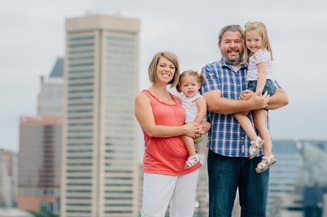Jesus our Redeemer, Baltimore MD
www.jesusourredeemer.com
Years @ the Church: 2
Church Type: merger/marriage between two churches
What led you to Church Revitalization or Replanting?
My family moved to Baltimore with a team of 25 friends for the purpose of planting a church. We found a church facility that we wanted to use for our public worship services and started to build a relationship with them. Ultimately I became convicted that I could not honor God by planting a “healthy” church in a facility owned by a “dying” church. God used the testimony of John Mark Clifton, a pastor that has experienced revitalizations, to help clarify this calling for me. I believe that our decision was one that brought glory to God as we seek to continue the legacy of our 160 year old church.
What have been your top 3 challenges as leader/pastor in this revitalization/replanting effort?
1) Learning to slow down. As a church planter I had expectations of how quickly things would progress. When we sensed God calling us to merge with the older church it meant that things would slow down. This is not my preference, but God has used it greatly in my life to build perseverance.
2) Learning to love all the sheep. With a church planting team of 25 we had a bunch of people that relocated to Baltimore for the purpose of living out the mission of loving our neighbors and making disciples. When we adopted the older members from the exisiting church we added a lot of different sheep with different expectations. This has been difficult to navigate, but God has used it to build a deeper love in my soul for all of our sheep.
3) Getting our house in order. When we started to discuss the marriage of our two churches we learned that they didn’t have a membership role. This was difficult for a pastor that has a high view and value of membership. We learned that accounting had been done to the best of the treasurers ability, but not up to the standards we had for our church plant. Working to get our house in order after the merge was difficult, but God used it to sanctify me as in the other challenges.
What are three “If I could start all over again” learnings you have as result of your work?
-I would be far less convinced that I know everything. I was confident going into this marriage, but sadly on many occasions that confidence grew into arrogance.
-I would have considered revitalization as an equal calling to church planting and not a lesser calling. I convinced myself that I wasn’t a revitalizer because of a few personality tests I had taken and because I hate moving slowly. Doing it all over again I would have seen saving a dying church as a greater way to glorify God than starting a new church that was just what I wanted.
-I would have prepped myself for the spiritual warfare aspect that is bound to come when attempting to save a dying church.
How is God showing Himself faithful in your work? Where do you see Him at work?
The first thing that I want to mention is that God’s faithfulness in our work isn’t seen in the absence of trials. We have faced our fair share of trails and we have seen God’s faithfulness to build His church.
One area where we have seen God’s faithfulness is in our children’s ministry. When we started gathering at the church they hadn’t had children in several years. Last year we had 6 babies born in our church and we have 10-15 kids under the age of 9 each week. This is something the older members love! They longed for the day when kids ran and screamed in the church.
Another area where we have seen God’s faithfulness is in the presence of young men leading within our church family. When a church is dying or dysfunctional you can almost certainly assume that they have no young men leading. God has blessed our congregation with two lay elders from the membership. In addition to that we have a handful of young men that go out and preach at other churches and a homeless shelter. We’ve also incorporated these young men into our preaching schedule at our church.
We’re also excited to see God’s faithfulness in regards to our preparation to multiply. We have one young man in the process of planting and/or revitalizing. The last time our church planted another church was 127 years ago. We can’t wait to multiply again for the sake of adding a gospel preaching church in our city. Also, we’ve recently started discussing our first international church plant which could possibly happen in the next three years.
What words of wisdom would you give to those considering Church Replanting or Revitalization?
Don’t do it.
That was some of the first advice that I got from a church planter in Baltimore when I was considering planting. It rings true for replanting and revitalizing. Don’t rush into this!
Take your time. Seek godly counsel from your elders. Submit to the assessment process of an organization that can develop your self-awareness. If you are married you better listen to your wife. She knows you and more than likely she doesn’t have any grandiose dreams of being that celebrity pastor speaking at conferences.
Be aware that this will quite possibly be the one of the most difficult and most rewarding things you’ve ever done in your life.
What resources have been most helpful to you and your Church as you seek to be Replanted/Revitalized?
To be honest, the greatest asset to me was my relationship with John Mark Clifton from the North American Mission Board. John Mark has done more in the area of revitalization than anyone else I’ve ever heard about. He is not only experienced; he is also extremely approachable and humble. In my opinion, there is no book or training that can replace a mentor that has been where you are going.
Where do you see the movement of Legacy Church Planting/Church Revitalization going?
I hope and pray that the interest in replanting/revitalizing continues to grow. If we want to make a difference in regards to advancing the kingdom then I think we should both plant new churches and revitalize old churches.
Is God calling you to Legacy Church Planting? Join the movement
Published February 18, 2015


